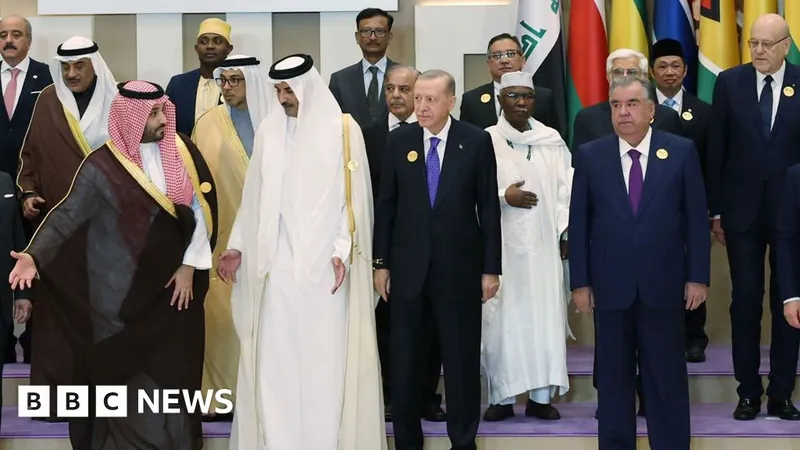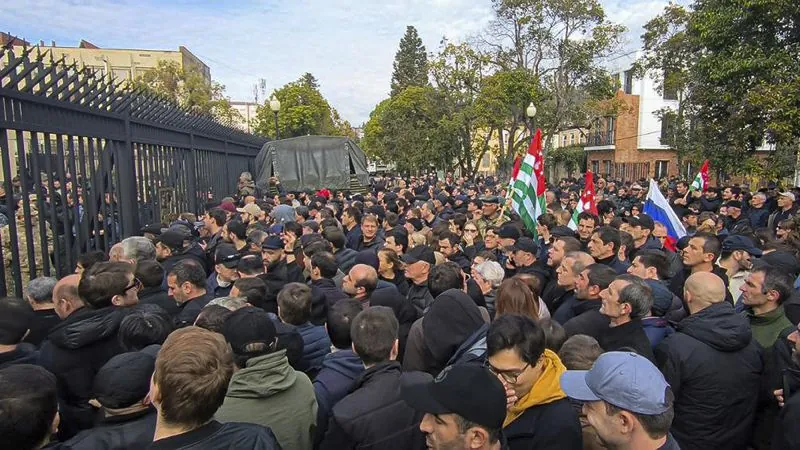
Saudi Crown Prince Accuses Israel of 'Genocide' Amid Heightened Tensions in Gaza
2024-11-12
Author: Ling
Introduction
In a striking condemnation, Saudi Crown Prince Mohammed bin Salman has labeled Israel's actions in Gaza as “genocide,” marking one of the most forceful criticisms of Israel by a Saudi official since the outbreak of hostilities. This statement was made during a summit attended by Muslim and Arab leaders, highlighting the urgency surrounding the ongoing conflict.
Condemnation of Israel's Actions
At the summit, the Crown Prince also admonished Israel for its military actions not only in Gaza but also in Lebanon and against Iran. His comments signal a nuanced shift in regional alliances, particularly between Saudi Arabia and its long-standing adversary, Iran. Bin Salman issued a stern warning to Israel regarding potential strikes on Iranian territory, emphasizing the need for respect and restraint.
Building a United Front
Alongside the Crown Prince, other leaders called for a complete withdrawal of Israeli forces from both the West Bank and Gaza. This united front underscores the growing discontent within the Arab world regarding Israel’s military aggression.
Critique of International Response
Furthermore, Saudi Arabia's Foreign Minister, Prince Faisal Bin Farhan Al-Saud, criticized the international community for its inaction, referring to the ongoing conflict as a “failing” that has allowed Israel's actions to go unchecked. He stated, “Where the international community primarily has failed is ending the immediate conflict and putting an end to Israel’s aggression,” condemning the humanitarian crisis that has ensued, including widespread starvation in Gaza.
Escalation of the Conflict
The current conflict escalated following Hamas’s attack on October 7, 2023, which resulted in significant casualties and hostages in southern Israel. Israel’s military response has been devastating, with reports indicating over 43,400 fatalities in Gaza, predominantly affecting women and children, according to the Hamas-run health ministry and supported by findings from the UN’s Human Rights Office.
Concerns Over UN Operations
Leaders at the summit also raised concerns about Israel's ongoing attacks on UN personnel and facilities in Gaza. Recently, the Knesset approved legislation prohibiting the United Nations Relief and Works Agency (UNRWA) from operating within Israel and occupied East Jerusalem, leading to severe criticisms from multiple nations, including the US and the UK, due to its implications for humanitarian aid delivery.
Political Dynamics and the Future
As political dynamics shift, the upcoming potential return of Donald Trump to the White House remains a significant topic. Gulf leaders recognize Trump’s strong ties to Israel but also see an opportunity for his relationship with the region to help broker peace. While Trump is regarded more favorably in Saudi Arabia compared to President Joe Biden, his previous term produced a blend of outcomes, both praised and criticized.
Conclusion
In a reflection of the changing landscape, an editorial in a leading Saudi publication captures the mood of the moment, declaring, “A new era of hope: Trump’s return and the promise of stability.” This ominous yet hopeful headline encapsulates the complex interplay of regional politics, conflict, and the quest for peace in one of the world’s most volatile areas.




 Brasil (PT)
Brasil (PT)
 Canada (EN)
Canada (EN)
 Chile (ES)
Chile (ES)
 España (ES)
España (ES)
 France (FR)
France (FR)
 Hong Kong (EN)
Hong Kong (EN)
 Italia (IT)
Italia (IT)
 日本 (JA)
日本 (JA)
 Magyarország (HU)
Magyarország (HU)
 Norge (NO)
Norge (NO)
 Polska (PL)
Polska (PL)
 Schweiz (DE)
Schweiz (DE)
 Singapore (EN)
Singapore (EN)
 Sverige (SV)
Sverige (SV)
 Suomi (FI)
Suomi (FI)
 Türkiye (TR)
Türkiye (TR)